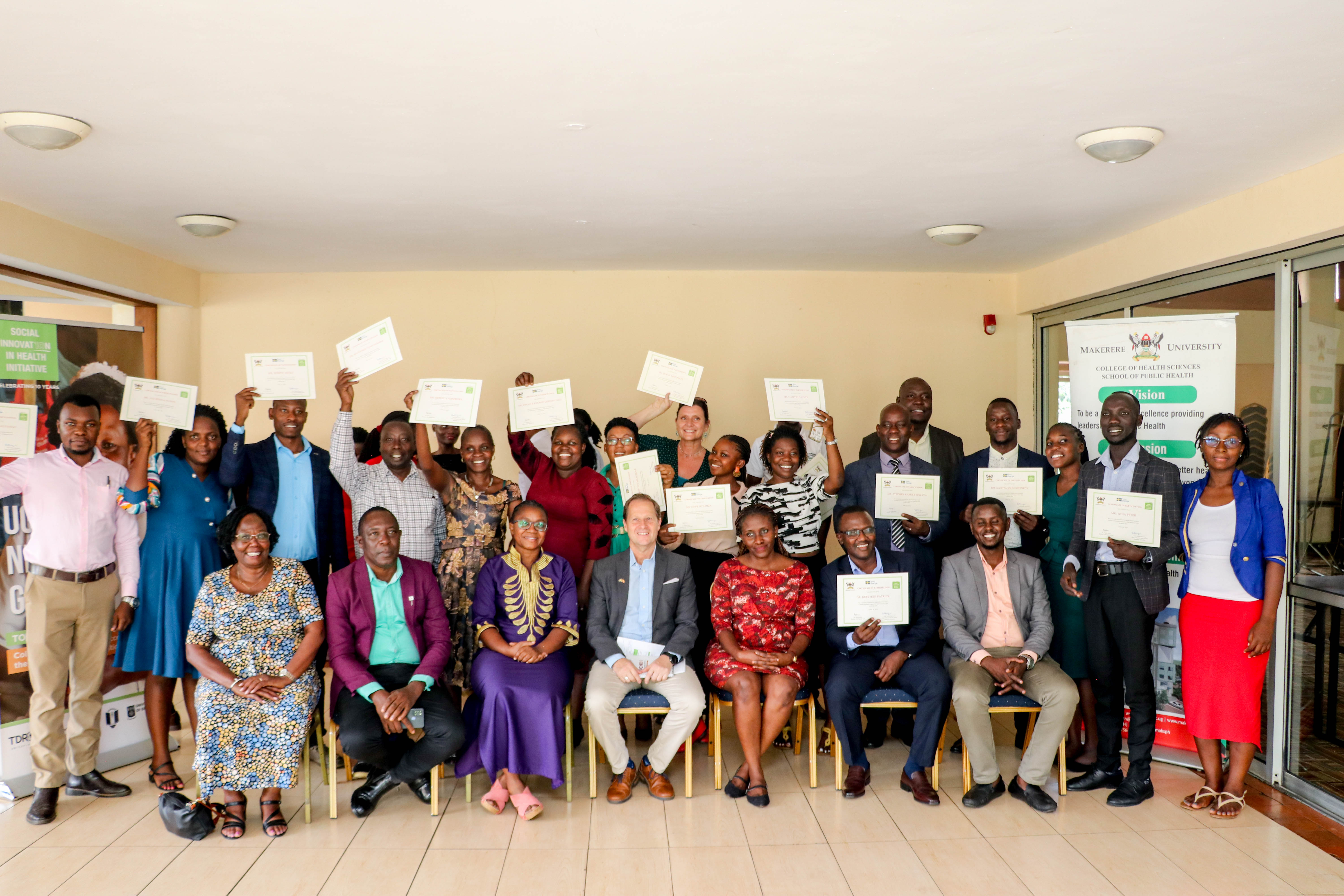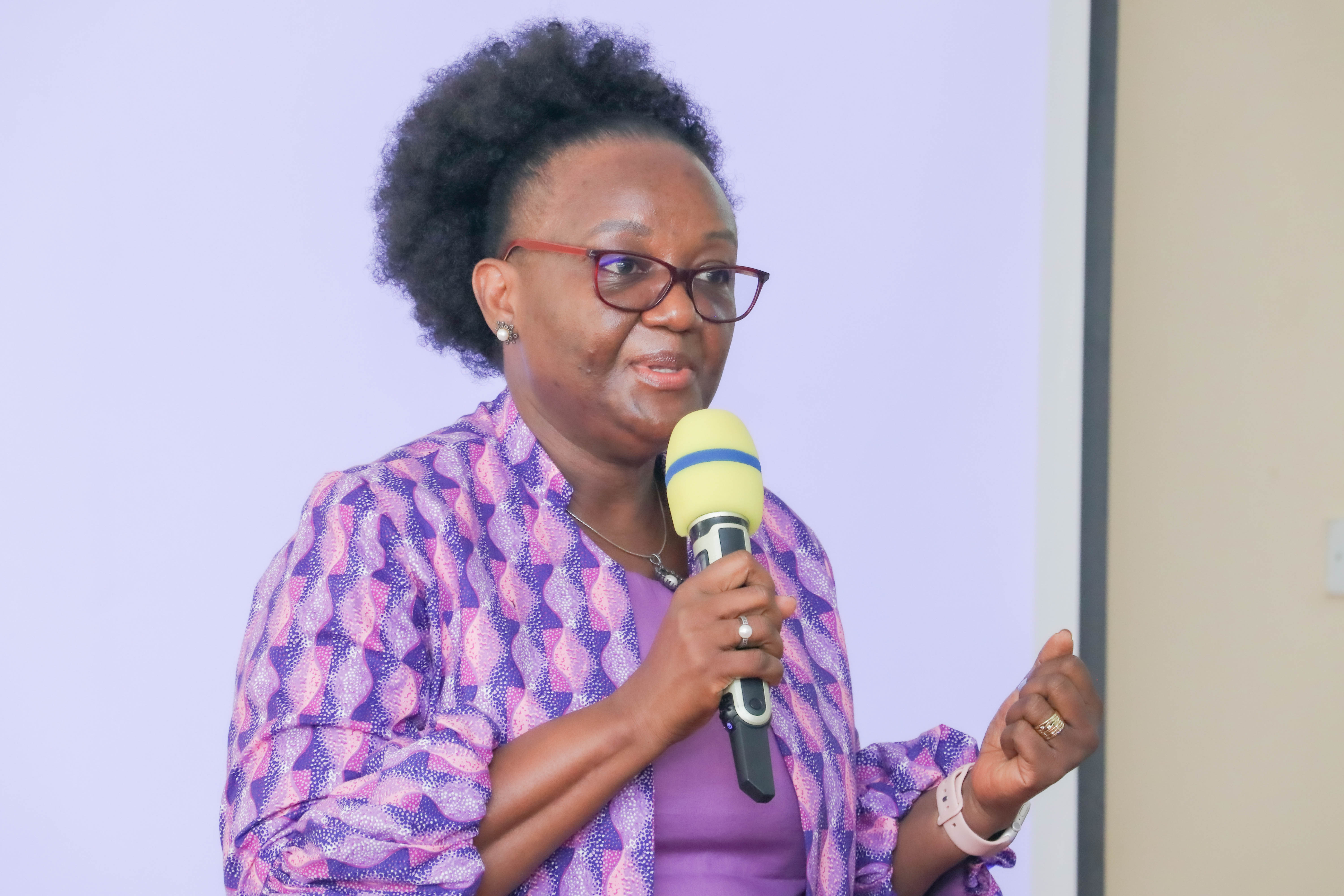
By John Okeya
The Dean Makerere University School of Public Health (MakSPH), Prof. Rhoda Wanyenze, has advocated for the integration of social innovations in health as a pivotal strategy towards expediting Uganda's progress in expanding Universal Health Coverage (UHC).

KAMPALA, Uganda — In her remarks at this year’s fifth Uganda National Social Innovation in Health (SIHI) Stakeholders Workshop, organized at the Golf Course Hotel in Kampala on 30th April 2024, Prof. Rhoda Wanyenze, the Dean MakSPH and renowned public health expert passionate about gender and health equity – emphasized the crucial role of social innovations in healthcare in expediting Uganda's progress towards achieving Universal Health Coverage.
The workshop brought policy experts, implementers, researchers, innovators, and students in public health together, under the MakSPH-based SIHI Uganda Hub led by Dr. Phyllis Awor, an initiative anchored towards promoting accessible, equitable, and affordable healthcare for every Ugandan through social innovation. Opening the workshop, Prof. Wanyenze noted that Uganda has persistent challenges undermining ongoing efforts to extend health services for all, urging for increased adoption and scaling of innovations in health to circumvent crippling financial hardships suffered by most Ugandans trying to access essential healthcare.
According to reports, Uganda has stalled on its progress to achieve UHC and guarantee good health outcomes and wellbeing for all by 2030. Data from the global watchdog, World Health Organization (WHO), and Uganda’s Ministry of Health (MoH) indicate that the stalemate is occasioned by challenges hindering rapid expansion of healthcare services, some of which, are related to poor quality health services, low hospital coverage, inadequate health infrastructure especially for the rural population, and shortage of medicine and health workforce.
“As a country, we have improved. Our indicators show progress but we still have a long way to go to ensure everybody has health and well-being, which is a right and yet, not a reality for many,” The Dean MakSPH noted with great concern, in line with Uganda’s hurdles to realizing UHC, while opening the 5th Social Innovation in Health Stakeholder Workshop.
The annual workshop exhibits health and gender social innovations identified through public calls, disseminates findings from studies made on these innovations, and strengthens capacity of the innovators through a yearlong Makerere University Social Innovation in Health Fellowship Program with essential skills in research, resource mobilization, monitoring and evaluation to support the scaling of the health innovations for increased social impact.
“There are so many people who are so ill out there, that have lots of challenges, but can hardly find help. They are struggling somewhere along the pathways of our health system,” Prof. Wanyenze observed emotively, appealing to the over 50 stakeholders during the workshop that: “The best way for us to achieve UHC is to make sure that we maintain the best standard of health possible: both physically, mentally, spiritually, and otherwise.”
She said the bottlenecks hindering our health and well-being as a country are attributable to gender gaps in health, poverty, access, and other issues beyond the health sector, including environmental health. She said this threatens especially the underserved people and vulnerable communities in Uganda, notably for the women, youth, and refugees;
“Many people are at risk of being left behind, and that is one of the most critical components of Universal Health Coverage, that people should not be left behind; older persons, people with disability, people in slum areas, refugees, and displaced people. Health coverage should be for all but we know that these populations are especially at risk. We also know the biggest part of our population, the young people, are not accessing the services they need across the spectrum of their healthcare needs.” Prof. Wanyenze observed.
For Dr. Phyliss Awor, the Principal Investigator and Project Lead for the Social Innovation in Health (SIHI) – Uganda Hub, our healthcare challenges are not far from the picture painted by the Dean, reiterating her call for the need to work with communities in developing and designing social interventions that improve the health and wellbeing of Ugandans.
“The opportunity we have is in harnessing all the resources we have, and particularly working with communities and engaging together to transform our health systems. We need to work together because of the significance and gaps that we have, otherwise, interventions that are introduced without working with stakeholders are not sustainable.” Dr. Awor noted.

Since its launch in the country in 2017, SIHI has worked with the Ministry of Health, local communities, and Community Based Organizations (CBOs) to develop joint interventions to improve health. Dr. Awor revealed that these innovations create tailored solutions that are more effective, inclusive, equitable, affordable, collaborative, and people centered, underscoring that the initiatives are strong on engagement with all stakeholders and use a bottom-up approach to transform health systems for better health outcomes.
“We look at providing more effective solutions to the health challenges we are currently facing, addressing the demand, generating the impact, and creating critical change. These innovations can be additive, radical, or just better approaches.” Dr. Awor said.
This year, 25 participants graduated from the Makerere University Social Innovation in Health Fellowship program and were awarded with certificates of completion of training, bringing the total tally to 40 for the last 2 cohorts of the fellowship. During the workshop, the fellows exhibited impactful social innovation projects selected and implemented between 2022-2023, by the different organizations that include Change Development Initiative, Amref Health Africa, and Baby Ubuntu Programme.
The other innovations exhibited came from Baitambogwe Community Health Initiative, Kampala Capital City Authority, Innovation Program for Community Transformation, and Diversity Innovations Initiative.
Makerere University School of Public Health strategic focus for 2020 – 2030 decade is guided by transformative education, knowledge generation and translation, and partnerships, with the goal of promoting better health for the people of Uganda and beyond through public health training, research and communality services. In fulfilling this mission, the School supported the innovators through the fellowship program. However, the Dean urged the graduands to put the knowledge gained to impact the community.
“I congratulate the fellows. Thank you for being part of this journey, and I would like to encourage you to continue to use the skills that you have picked up from these workshops to better serve the communities. On behalf of the School of Public Health, we are delighted to have been part of this journey with you, and congratulations!” Prof. Wanyenze said.
The SIHI Uganda Hub at Makerere University School of Public Health is part of a network of Social Innovation in Health, with 13 participating Hubs in the Global South and partnerships across the globe. The initiative in Uganda is supported by the Government of Sweden through the Swedish Embassy in Uganda, WHO, World Bank, UNICEF and UNDP.
Globally, over the course of over ten years, the Network has produced over 25 innovation calls, identified 500 community-based interventions and published over 100 journal articles. It has also undertaken 55 individual smaller research projects and developed multiple Tools and demonstration videos for training in the Global South.
Meanwhile in Uganda, Dr. Awor revealed that the initiative links actors – innovators, policy makers, researchers, funders, and communities, to support community-based interventions. So far, the Ugandan Hub has had six innovation calls, published over 20 research papers and worked with over 20 innovation civil society actors and the Health Ministry to improve better health outcomes for Ugandans through social innovation. The Hub has also designed health innovators fellowships, provided social innovation grants, and produced partnerships and networking opportunities for the different stakeholders in health.
Representing the Director General of Health Services at Uganda’s Ministry of Health, Dr. John Paul Bagala, the Technical Officer Safe Motherhood echoed the importance of collaboration and innovation in advancing healthcare in Uganda:
“No one can address the problems we have in this country when you work alone. For many years, we have seen that we all agree in this room that it can never work. What's going to take us forward, is cohesion and working as one solid unit.” Dr. Bagala stated.

“Strengthening our health system is a collective responsibility. As Ministry of Health, we have borrowed examples from elsewhere and we know the value of academic institutions in shaping policy and practice. We want to see that work here. If Makerere School of Public Health has a solution that we can utilize and help us, then let us get together and see how we can utilize that to move forward.” He added.
Addressing bottlenecks such as gender disparities, environmental health issues, and accessibility barriers, Prof. Wanyenze urged for a comprehensive approach to healthcare that encompasses prevention, treatment, and community engagement towards achieving UHC.

She encouraged MakSPH students, early career researchers, and social health innovators to focus on addressing public health challenges through innovation, extending gratitude to Dr. Phyllis Awor, the Ministry of Health, and Swedish Embassy and all the partners for their contributions to the SIHI initiative, emphasizing the need for collaborative efforts to scale up successful interventions and improve health outcomes for Ugandans.
Please follow this link to view some of the impactful work of Social Innovation In Health (SIHI) in the communities in Uganda:https://youtu.be/sD2k6CCAMJ4?si=30C6wYSnhqT2JlUG

